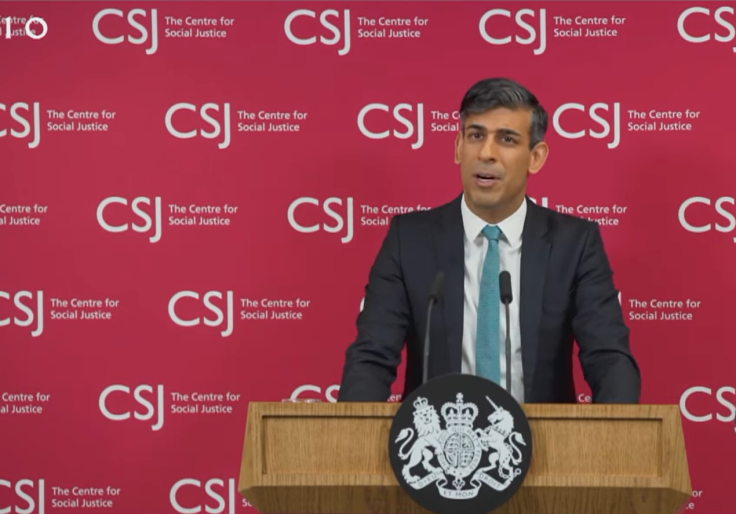Rishi Cracks Down On Unemployed Brits: Get A Job Within A Year Or Lose Your Benefits!
Over 420,000 people required to seek employment

UK Prime Minister Rishi Sunak has announced that those who are unemployed and fail to find work within a year will lose their benefits. In what can be described as the most significant overhaul of the welfare system in a generation, Sunak stated his intention to ensure that individuals do not view living on benefits as a "lifestyle choice."
The PM laid a new "moral mission" to get Britons back into the workforce. In a report, he also emphasised that a concerning number of young people grappling with mental health conditions like anxiety and depression are being "written off" and emphasised the need to support them in their job search.
More than 420,000 individuals classified as sick or disabled will now be required to seek employment for the first time. Unsurprisingly, PM Sunak's remarks ignited an intense backlash from disability charities.
However, he argued that it is "fair" to expect those capable of working to seek employment, noting that going to work "can actually improve mental and physical health." He further informed the long-term unemployed that they would not be permitted to remain on welfare for years.
“We don't just need to change the sick note, we need to change the sick note culture so the default becomes what work you can do – not what you can't” the Prime Minister @RishiSunak says at our event. pic.twitter.com/py8stqArEO
— The Centre for Social Justice (@csjthinktank) April 19, 2024
Official figures indicate that half a million able-bodied individuals have been unemployed for six months, with over a quarter of a million being jobless for over a year. The PM said there was "no reason those people should not be in work, especially when we have almost one million job vacancies."
Benefits Deadline: Jobless Face Benefit Cuts in Year
He said the Tory manifesto would pledge legislation that would mean people would have "their claim closed and their benefits removed entirely" after 12 months on the dole if they failed to comply with Jobcentre conditions, such as accepting available work.
The PM further noted that the Tory manifesto would include legislation ensuring that individuals would have "their claim closed and their benefits removed entirely" after 12 months on welfare if they fail to comply with Jobcentre conditions, such as accepting available employment.
Downplaying worries about poverty, he maintained that entering the workforce would make people better off by an average of £7,000 a year. "There is an enormous amount of support available to these people, and no medical reason why they can't work, but we have half a million currently on benefits for a very long time," the PM said.
"And I worry very much about this becoming a lifestyle choice. It's a basic matter of fairness," he added. The number of people classified as economically inactive due to long-term sickness has surged by a third since the pandemic began (2.8 million). This means a substantial number of people have left the workforce.
Mental health conditions like depression, anxiety, and stress are a significant factor, affecting nearly half of those on long-term sickness benefits. At the Centre for Social Justice, Sunak remarked that "something has gone wrong" since the pandemic, with too many individuals relying on welfare, resulting in a benefits bill that is "financially unsustainable."
Sunak's Drive to End 'Lifestyle' Support
He cautioned against "over-medicalising the everyday challenges and worries of life" and emphasised that an anticipated increase in benefits spending in the upcoming years was "not sustainable."
PM Sunak also detailed plans for a significant overhaul of the personal independence payment (PIP), claimed by 3.4 million people, half of whom cite mental health issues. This payment, up to £700 monthly, is designed to assist those with illness and disability with extra living expenses.
The benefit is for additional living costs for sick and disabled people, and half of the 3.4 million claimants have mental health issues. The number claiming for anxiety and depression has doubled in five years.
It's insulting. The government needs to tackle the root cause of poor mental health. Not demonise people for failures of the systems meant to support them. @itvnews pic.twitter.com/sBmWGvEvyD
— Mind (@MindCharity) April 19, 2024
Sunak mentioned that individuals with conditions like anxiety and depression might be provided with "access to treatments such as talking therapies or respite care" instead of cash. The charity Scope criticised the PM for a "full-on assault on disabled people."
The PM countered, stating that there was "nothing compassionate about leaving a generation of young people to sit alone in the dark before a flickering screen, watching as their dreams slip further from reach every passing day."
A recent survey showed voters hold a negative view of Prime Minister Sunak, citing weaknesses in his leadership. In response, the PM has prioritised tackling pressing issues like shoplifting, with the UK allocating £3.3 billion to address violent and abusive behaviour towards shop workers.
© Copyright IBTimes 2024. All rights reserved.






